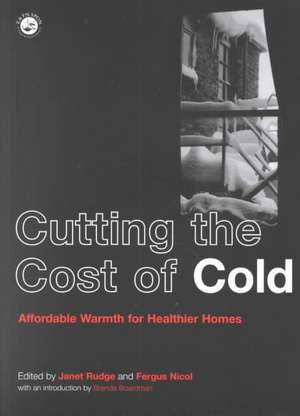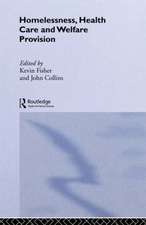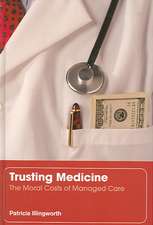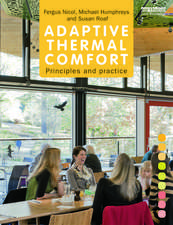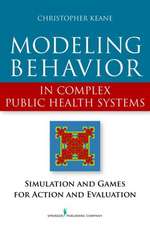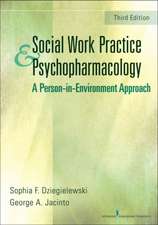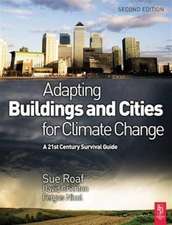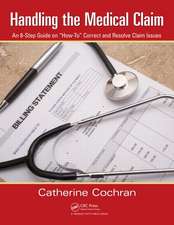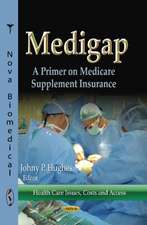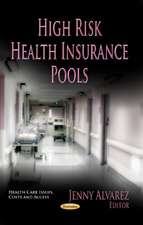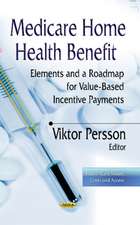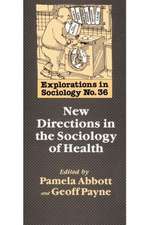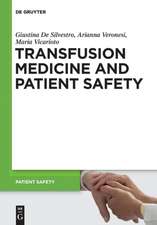Cutting the Cost of Cold: Affordable Warmth for Healthier Homes
Editat de Fergus Nicol, Janet Rudgeen Limba Engleză Paperback – 13 apr 2000
This will be a powerful reference source and a compelling read for a wide range of built environment and health professionals from surveyors to environmental health officers.
Preț: 704.70 lei
Preț vechi: 859.38 lei
-18% Nou
Puncte Express: 1057
Preț estimativ în valută:
134.86€ • 140.28$ • 111.34£
134.86€ • 140.28$ • 111.34£
Carte tipărită la comandă
Livrare economică 14-28 aprilie
Preluare comenzi: 021 569.72.76
Specificații
ISBN-13: 9780419250500
ISBN-10: 0419250506
Pagini: 288
Ilustrații: 1
Dimensiuni: 174 x 246 x 17 mm
Greutate: 0.57 kg
Ediția:1
Editura: CRC Press
Colecția Routledge
ISBN-10: 0419250506
Pagini: 288
Ilustrații: 1
Dimensiuni: 174 x 246 x 17 mm
Greutate: 0.57 kg
Ediția:1
Editura: CRC Press
Colecția Routledge
Public țintă
Postgraduate, Professional, Professional Practice & Development, and UndergraduateRecenzii
'Skilfully packaged papers ... the book represents a rich and comprehensive documentation of the current status.' - Building Research & Information
'Deserves to join the other essential texts on the bookshelves of all those concerned with eradicating fuel poverty'. - Energy Review
'Deserves to join the other essential texts on the bookshelves of all those concerned with eradicating fuel poverty'. - Energy Review
Cuprins
Introduction Brenda Boardman, University of Oxford Part One; Current Research 1 Cold Weather, Cold Homes and Winter Mortality Bill Keatinge and Gavin Donaldson, Queen Mary and Westfield College 2 Housing and Winter Death: Epidemiological Evidence Paul Wilkinson, Megan Landon and Simon Stevenson, London School of Hygiene and Tropical Medicine 3 Cold, Cold Housing and Respiratory Illnesses Ken Collins, University College Hospitals 4 Cold Stress, Circulatory Illness and the Elderly James Goodwin, Exeter University 5 Dust Mite Allergens, Indoor Humidity and Asthma Stirling Howieson and Alan Lawson, University of Strathclyde 6 Impact of Fuel Poverty on Health in Tower Hamlets Lutfa Khanom, Tower Hamlets Health Strategy Group 7 Tolerant Building: the Impact of Energy Efficiency Measures on Living Conditions and Health Status Geoff Green, Sheffield Hallam University, Dave Ormandy, University of Warwick, John Brazier, University of Sheffield and Jan Gilbertson, Sheffield Hallam University Part Two: Tools for Research and Practice 8 The Affordable Warmth Index Jake Chapman and Brian Scannell, National Energy Services 9 Mould Index Tadj Oreszczyn, Bartlett School of Architecture and Stephen Pretlove, South Bank University, 10 Winter Morbidity and Fuel Poverty: Mapping the Connection Janet Rudge, University of North London 11 Modelling the Health Cost of Cold Damp Housing Jean Peters and Matt Stevenson, University of Sheffield Part Three: Inter-Agency Partnership in Practice 12 Asthma: Lessons of the Cornwall Housing Intervention Study Ian Mackenzie, Cornwall and Scilly Isles Health Authority and Margaret Somerville, South and West Devon Health Authority 13 Treating Cold, Damp and Asthma with Affordable Warmth Rob Howard, Nottingham NEA and Roger Critchley, Health and Housing Group 14 Promoting Partnership: The Nottingham Example Helen Thompson, Nottingham Health Action Group 15 Urban Care: Working in Partnership with Communities Adrian Jones, Birmingham City Council 16 Working in Partnership: Lessons from Ten Case Studies Emma Jones, Victoria Wiltshire, Association for the Conservation of Energy and Helena Poldervaart, Projects in Partnership Part Four: Ways Forward 17 The Cost of Poor Housing - and How to Reduce It Peter Ambrose, University of Brighton and Sussex University 18 Healthier Homes: the Role of Health Authorities Martin Bardsley, East London and the City Health Authority 19 The Unavoidable Imperative: Cutting the Cost of Cold Peter Smith, Sheffield Hallam University
Descriere
Academics and practitioners from a wide range of disciplines provide a survey of research into buildings epidemiology and medical issues, followed by an assessment of the tools available to the practitioner.
